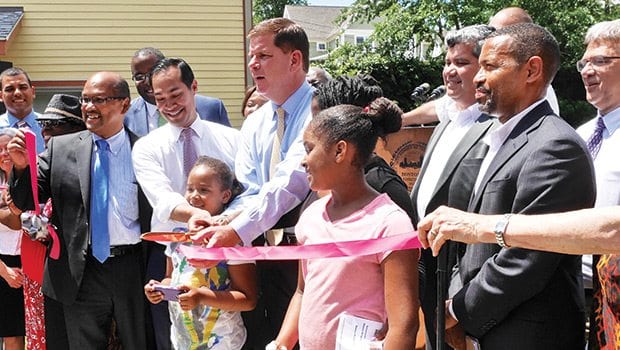
U.S. Department of Housing and Urban Development (HUD) Secretary Julián Castro joined Mayor Martin Walsh on July 7 to celebrate the official ribbon-cutting for Quincy Heights, an affordable housing complex made possible in part by a $20.5 million HUD Choice Neighborhoods Initiative Grant awarded in 2011.
“Congratulations on getting this done,” said Castro, speaking under blazing midday sunshine on a sweltering day.
“The Choice Neighborhoods Initiative, created by President Obama, is responsible for transforming what were once vacant lots, crumbling parks and storefronts and distressed housing into the vibrant new Quincy Corridor that you see today,” said Castro. “It has become one of our nation’s most important tools in the fight to ensure that no matter where a child is born, that child has the resources and strong foundation to succeed.”
Boston was among the first cities to receive funding under the Choice Neighborhood Initiative, and is the first to bring a residential project to completion.
“Today we are able to add another first to Boston’s long and storied list. And we couldn’t have asked for a better partner on this journey,” continued Castro, praising the city of Boston for exemplary “collaboration, perseverance and leadership.”
The residential project, located at Quincy and Magnolia Streets, includes the refurbishing of 80 units from the former Woodledge/Morrant Bay development along with new construction of 40 additional units.
“This is truly a big deal,” said Daryl Wright, board president of the Dorchester Bay Economic Development Corporation, which developed the housing along with Quincy Geneva Housing Corporation and United Housing Management. “It’s a testament to our shared investment in people, neighborhoods and housing.”
Wright said that the initial HUD investment helped leverage millions of dollars in additional funding, allowing the creation of playgrounds, improved wireless network access and community buildings in addition to housing units.
He also listed out some of the construction workforce numbers for the Quincy Heights project. Over half of the workers on the project were Boston residents, he said, and 44 percent of the contractors were minority business enterprises. The labor was 45 percent union and 55 percent open shop.
“We built this,” Wright said. “We … built … this.”
Mayor Martin Walsh expressed thanks to Dubois, to the many local partners in the Quincy revitalization project and to Castro and HUD.
“Secretary Castro, as a former mayor, understands that America needs strong cities,” said Walsh. “And he is going to see today that Dorchester Bay EDC is not just about building homes, but also about building businesses and creating job opportunities.”
The Quincy Heights project is part of a larger revitalization of the Quincy Corridor that also included the creation of the 35,000-square-foot Bornstein & Pearl Food Production Center in the old Pearl Meat Factory. After the speaking program, Castro accompanied Walsh on a tour of the food production center, which was developed by DBEDC in partnership with CropCircle Kitchen, now known as CommonWealth Kitchen. The center has supported more than 50 food production businesses and created 80 jobs in its first three years.
Before the ribbon-cutting, Quincy Heights resident Tahiewah Garner attested to the quality of the apartments and the surroundings.
“The development is beautiful. It’s good for families,” said Garner, a mother of three. “Thank you for providing the opportunity to raise my family in this community, which I love.”






